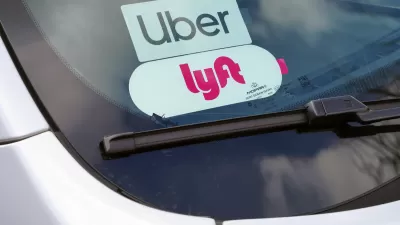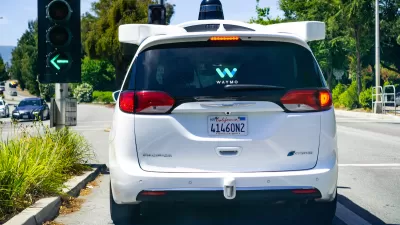The legalization (or illegalization) process of Uber throughout the country allows city governments to leverage a data exchange with the company, but too many municipalities are passing up this momentous opportunity.
Last week Washington D.C. passed legislation legalizing services such as Uber and Lyft. However, according to Emily Badger of the Washington Post, the city missed a huge opportunity to better understand the movement of its residents and hold these private companies accountable by not demanding access to privatized passenger trips taken (and canceled).
As Badger writes, the vast amounts of anonymized data collected by Uber protecting both drivers and riders, "would help cities verify that Uber drivers aren't discriminating against certain neighborhoods or disabled passengers, that Uber is actually weeding out drivers who do, that the company is truly serving the public in exchange for the public's confidence in it."
In addition to greater amounts of accountability, the data would be particularly useful for "transportation planners, who spend a lot of time (and money) trying to understand the travel patterns of residents that are already passively captured by transportation apps. Uber is building a sophisticated picture of how people move around many cities — where the demand is, where people want to go, when those trips take place down to the minute... it could also help cities plan infrastructure, manage traffic flow, and understand commuters better."
FULL STORY: Uber’s data could be a treasure trove for cites. But they’re wasting the chance to get it.

Alabama: Trump Terminates Settlements for Black Communities Harmed By Raw Sewage
Trump deemed the landmark civil rights agreement “illegal DEI and environmental justice policy.”

Planetizen Federal Action Tracker
A weekly monitor of how Trump’s orders and actions are impacting planners and planning in America.

The 120 Year Old Tiny Home Villages That Sheltered San Francisco’s Earthquake Refugees
More than a century ago, San Francisco mobilized to house thousands of residents displaced by the 1906 earthquake. Could their strategy offer a model for the present?

Ken Jennings Launches Transit Web Series
The Jeopardy champ wants you to ride public transit.

BLM To Rescind Public Lands Rule
The change will downgrade conservation, once again putting federal land at risk for mining and other extractive uses.

Indy Neighborhood Group Builds Temporary Multi-Use Path
Community members, aided in part by funding from the city, repurposed a vehicle lane to create a protected bike and pedestrian path for the summer season.
Urban Design for Planners 1: Software Tools
This six-course series explores essential urban design concepts using open source software and equips planners with the tools they need to participate fully in the urban design process.
Planning for Universal Design
Learn the tools for implementing Universal Design in planning regulations.
Clanton & Associates, Inc.
Jessamine County Fiscal Court
Institute for Housing and Urban Development Studies (IHS)
City of Grandview
Harvard GSD Executive Education
Toledo-Lucas County Plan Commissions
Salt Lake City
NYU Wagner Graduate School of Public Service





























